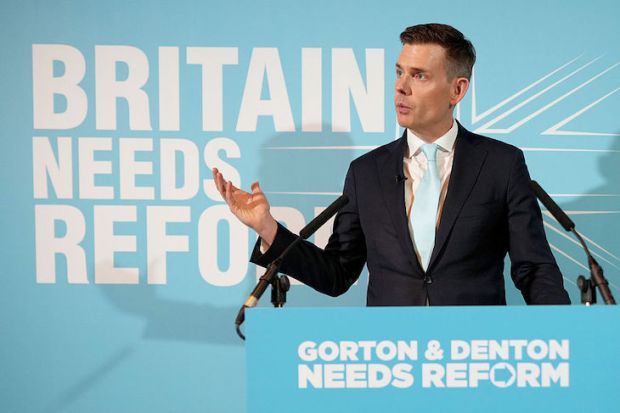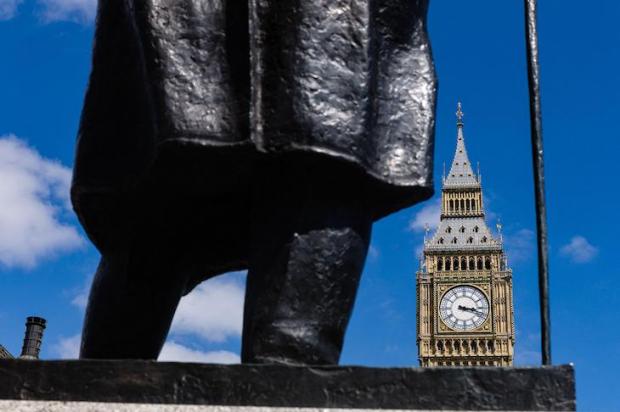To listen to the would-be prime ministers of the Conservative party, things in Britain are going pretty well. Sure, Covid knocked the public finances off course, and the war in Ukraine has driven up prices at the pump, but structurally, Britain holds strong. This is about as far from the truth as it is possible to be. Unless the next prime minister can shake off this delusion, Britain is facing a second lost decade of economic growth.
It’s important to put into perspective just how bad the last few parliaments have been. If the UK continues with the same level of growth it has seen for the last decade, Poland will be richer than Britain in about 12 years’ time. It sounds like an absurd idea that in 2040 we might see complaints in the Polish press about a flood of British plumbers undercutting wages, or Brytyjski Skleps lining the rougher areas of Warsaw, but it isn’t beyond the realms of possibility.
It’s also far from guaranteed. Sustaining growth rates is hard. Poland could drop off pace or Vladimir Putin could decide to go out in a blaze of glory. But what we can be pretty sure of is that Britain isn’t going to improve any time soon. Last month, the OECD predicted that next year the UK would have the worst growth rate in the developed world.
The UK’s economic performance since the financial crisis has been abysmal. From 1950 to 2007, the British economy grew about 2.8 per cent each year. This was disappointing; while people were still getting richer, relatively slow growth meant that a host of countries overtook us in output per person – the key measure of economic well-being. For much of the latter half of the 20th century, Britain was outperformed by countries like France, Belgium and the Netherlands, not to mention Israel, New Zealand and Japan. Economists fiercely debated the cause of Britain’s relative economic decline but the sluggish rate of growth couldn’t be denied.
Between the financial crisis and the Covid pandemic, Britain managed to grow at 1.3 per cent each year. Cutting out the 2007-08 recession boosts this figure to just about 2 per cent. In per person terms, this performance has been even worse; a growth rate of 0.6 per cent per year. To put this into context, it took until 2014 for the UK to get back to where it was in 2007. Wages in 2022 are slightly below where they were in 2008.
Britain, in other words, had lost a decade and a half even before the pandemic hit. And it’s not about to improve. How did this happen? We know what failed states look like in the 21st century. The term conjures up images of Mogadishu or Kabul; the disintegration of the government, the descent of the country into warlords and ethnic loyalties. But beyond such a spectacular collapse, it’s possible for states to fail in another way. They can become too static.
The American economist Mancur Olson argued that societies insulated from political upheaval start to accrue too many vested interests. These vested interests use institutional levers to veto disruption to their position. Stable nations eventually begin to ossify, caught in the grip of an institutionalised sclerosis. In a wealthy country, the result is a sort of high-level equilibrium that is very hard to escape.
One marker of this situation might be a massive expansion of the state into regulating the private economic affairs of its citizens, ‘a regime of paper work and harassment, endless paper work and endless harassment’. Slowly, an omnipotent bureaucracy and ‘welfare state’ emerges, one that that ‘superintended, to the minutest detail, every step its subjects took from the cradle to the grave’. This description was given to us by the Hungarian sinologist Étienne Balazs, describing the atrophy of growth and death of innovation in imperial China; in a regime where stability was valued above all and change was seen as a threat to the established order, regulation and bureaucracy choked the disruption necessary for the economy to thrive. Britain’s own mandarins have taken this advice to heart. The UK’s failure to grow can be explained in four words: it’s not allowed to.
The barriers to getting things done start with planning. Britain has world-leading universities in London, Oxford and Cambridge, and firms are desperate to make use of these talent pools. What we don’t have is lab space for these companies and researchers to work in; London has 90,000 square feet of suitable space available, compared to 14.6 million square feet in Boston, Massachusetts. Which of these cities is going to give a scrappy biotech start-up the best shot at becoming a global behemoth?
Runaway house prices reveal an utterly dysfunctional market. Restricting housing supply means that people can’t live where their skills are best put to work and firms can’t hire the labour they need to expand. Letting people live where they want to doesn’t just improve their lives, it makes us all richer; researchers in America found that liberalising planning laws in just three cities would have made the US economy 14 per cent larger.
That the planning system obstructs growth isn’t surprising; it’s doing what it was designed to. The Town and Country Planning Act of 1947 set out to tell people where they could live, where they could work, and what they could build. If growth wants to happen in the wrong places, well, tough. So dedicated were postwar planners to this vision that laws were made to choke growth in Birmingham, even going so far as to mandate a target population lower than that already present.
This inability to get things done extends to infrastructure. Oxford and Cambridge should be the centrepiece of the British economy; two nearby cities that should be joined by rapid travel, creating a massively productive region filled with cheap housing for researchers and tech workers. Instead, it takes four hours to travel between the two by train via London. Plans to develop the Oxford-Cambridge Arc were put on hold after the Chesham and Amersham by-election, in which the Liberal Democrats demolished a 24,000 votes majority in a traditional Tory stronghold. Here we see those vested interests, shire homeowners making clear that disruption to their rural lives will not be tolerated. Only one candidate for leadership was bold enough to challenge this consensus: Sajid Javid backed the Arc ‘to create a new hotbed of growth’, alongside visions for new towns and garden villages. Not coincidentally, he’s already out of the running.
At Heathrow, plans for a third runway have been kicking about since 2003. Parliamentary approval finally came in 2018, followed by a court ruling two years later that a new runway would be illegal. An appeal finally found that those plans could go ahead. Meanwhile, Amsterdam Schiphol airport benefits from the flights that should be landing here. In recognition of this fact, every time Britain delays a final decision, they send a thank-you cake.
The vetocracy extends into trade, too, which of course means higher prices for consumers. Britain’s largest container port isn’t Dover or Liverpool. It isn’t Teesside or London. It’s on a small patch of the English coast just a few miles from Ipswich: Felixstowe. If a town of 25,000 people far from the UK’s largest population centres (it’s two hours by train from London) seems like a curious place to put a major shipping port, then you’d be right. Its prominence isn’t a natural result of market forces, but a legacy of the distortions produced by British regulations.
Felixstowe owes its success to being nimble; as the first port equipped for containerised shipping, it benefited from a first mover advantage that cemented its position. It was able to make this transition because, as a tiny port, it was exempted from the UK’s National Dock Labour Scheme, which would otherwise have mandated negotiations over staffing requirements, essentially ensuring dockworkers had a job for life. The scheme was abolished at the tail-end of the Thatcher era, but Felixstowe’s exemption allowed it to become the largest container port in the country.
There is, unfortunately, no such loophole that will let it escape the UK’s planning regime. The port first applied for planning permission to construct a new harbour in 2003. Permission was eventually granted in 2006, after two public inquiries. By the time the project was approaching kick-off, the world tumbled into recession. In 2010, the port had to apply to extend the period in which it would be allowed to build. The project then got bogged down in judicial review until 2013. At that point, a member of the group ‘Residents Against Port Expansion’ complained the work would harm wild birds. The final planning permission was given in 2022, over objections from the government body Natural England.
Felixstowe is a major port, a vital artery for trade. It took 19 years for a project to get final approval because of the sheer number of vetoes built into the system. In the same period, China more than quadrupled its shipping capacity. And the planning system is far from the only bit of government piling costs onto businesses and consumers.
Companies face a mountain of red tape and restrictions. EU data protection rules don’t just cost businesses hundreds of millions of pounds in compliance costs; it stops them from entering the market. One study found that a third of Android apps exited the EU market after the law came into force. Of course, the UK adopted those GDPR rules in full during the Brexit period. Now, the UK’s Online Safety Bill will cost companies £1.7 billion in its first decade (although the continued existence of that bill is now thankfully in doubt). Once you start looking, the costs add up; companies are now expected to report their exposure to climate change and make sure their new offices have electric vehicle charging points. And when, despite these obstacles innovation and investment somehow happen, the government expropriates an ever-increasing share of the profits in taxes. The UK tax burden is now set to reach its highest level since the 1940s, with national insurance and corporation tax increases driving the increase.
What’s so frustrating about all this is that so much would be pretty easy to fix. The UK is still relatively prosperous. Britain doesn’t need the government to lead a great effort to reshape the economy. It just needs government to step out of the way. And yet the political culture in Britain has become de facto anti-growth. Governments make the right noises, but their actual priorities – levelling up, net zero, income inequality – are at best unrelated and often actively opposed to making Brits richer. This is particularly mad because every concern – every concern – the government has focused on over the last 20 years would be considerably easier if we lived in a richer country.
Worried about inequality? People feel it less when their pay packets are rising. Worried about the national debt? It’s more affordable when the economy is larger. Worried about the environment? Richer societies take better care of nature. Worried about defence cuts? You don’t need to make them if 2 per cent of GDP buys you enough new gear. The list goes on; the richer you are, the more you can do.
We’re used to thinking of Britain as a rich country. It still is, for now. But it’s nowhere near the cutting edge. If the United Kingdom was a US state, it wouldn’t quite be the poorest, but only just. We’d be $400 per person better off than Mississippi. Everywhere else – from Arkansas to Washington – would earn anywhere between several thousand to several tens of thousands more than us.
Wealth breeds complacency. George Staunton, secretary to the embassy to imperial Beijing, wrote that the people he found in China thought that ‘everything is excellent and that proposals for improvement would be superfluous’. This illusion was eventually shattered in humiliating fashion. How long until our idle presumption of never-ending prosperity comes to a similarly humiliating end?




















